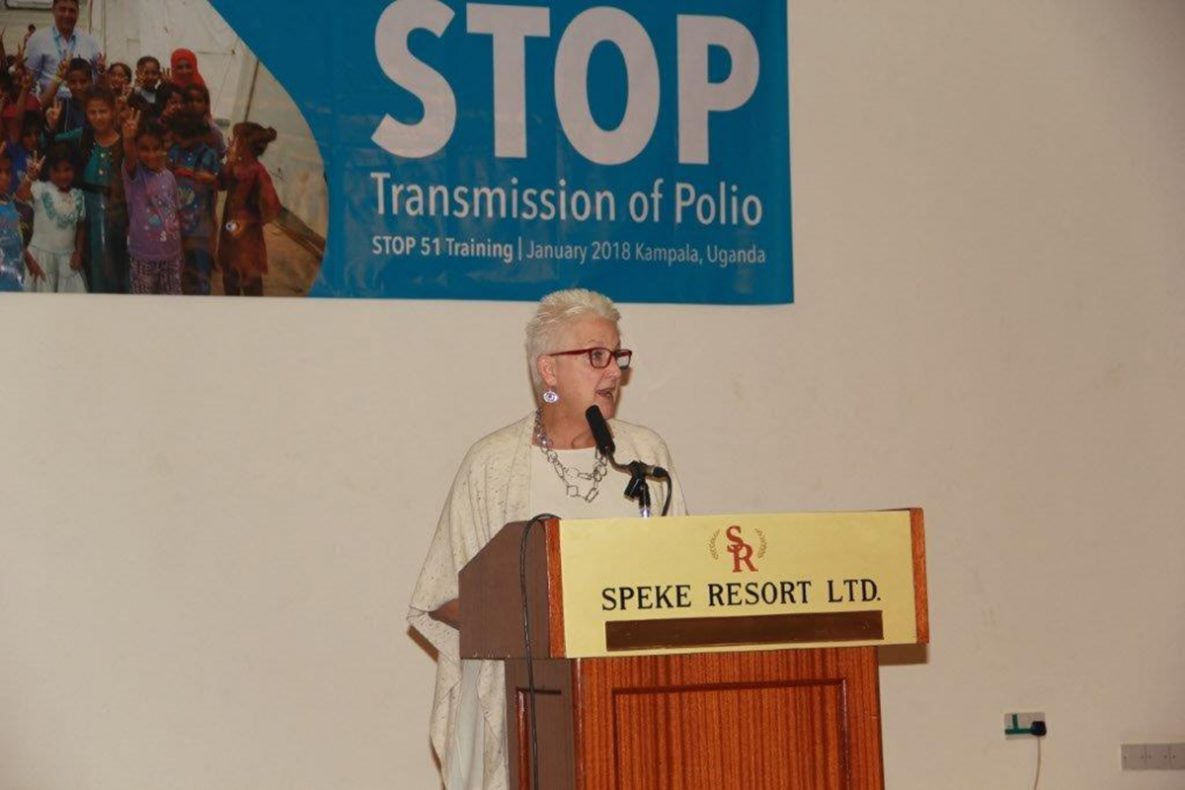One good turn deserves another: Uganda hosted STOP training for the third time

On June 4-22, 2018, Kampala hosted the 52nd Stop Transmission of Polio (STOP) training for the third consecutive time. The training, launched in 1998 by CDC’s Center for Global Health, Global Immunization Division as technical support to strengthen surveillance activities for the polio eradication program, was previously held at CDC headquarters in Atlanta. In June 2017, January 2018, and June 2018 the biannual training was conducted in Kampala.
“We are grateful to Uganda for hosting this important training. Doing so in the region rather than in Atlanta, as was done in the past, is more efficient and promotes a more sustainable model going forward,” Ambassador Deborah Malac said while addressing the participants.
With many countries grappling with a shortage of skilled public health staff available to support polio immunization and surveillance activities, STOP volunteers are critical to global polio eradication efforts; specifically working to fill gaps in the disease surveillance, supplemental immunization campaign planning, implementation, monitoring and evaluation by bringing this diverse expertise to countries that are still at risk for polio transmission.
The STOP program aims to train international public health professionals to be deployed to countries with the greatest need for support to improve their national immunization and surveillance programs. Now in its 20th year, the program includes participants from all over the world who are experts in their fields. This year’s training attracted 58 participants from 19 countries in East, West and Central Africa, and countries from Southeast Asia who are awaiting deployment. Volunteers participate in 10 days of field training in polio activities with an expansion into roles supporting measles mortality reduction, strengthening routine immunization activities, and supporting integrated disease surveillance programs. Topics covered include field epidemiology, data management, communication outreach, immunization system strengthening, and outbreak response.
STOP program impact
In 1998, when STOP began, there were 138 endemic countries. Today there are only three endemic countries. There has been progressive reduction in the number of wild poliovirus afflicted cases each year, with only 20 cases in 2017 from two endemic countries. This is the lowest number in the history of polio globally. The program has deployed over 2,000 participants on over 3,800 assignments in 75 countries during the past 20 years.
WHO and UNICEF, working in conjunction with national ministries of health, request skilled, short-term consultants from the STOP program, who can provide field support to immunization and surveillance programs. Considered the descendants of the “smallpox warriors” of the 1970s ─ hunting down the polio virus in the last reservoirs globally, CDC prepares STOP participants before they are deployed in the field through trainings like the ones held in Kampala. The public health professionals who successfully complete the STOP training are then deployed on six-month assignments to various countries identified by the program with the most need for assistance.
CDC’s support to Uganda’s immunization programs
In Uganda, CDC is part of all polio activities as well as providing support to prevent other vaccine-preventable diseases in the country, such as the regular immunization campaigns to boost immunity in children below five years and improving surveillance in high risk districts through the national STOP teams. CDC also supports introduction of new vaccines into health systems to accelerate the reduction of child mortality. Uganda was part of “The Switch” in 2016, a global milestone which replaced the trivalent oral polio-vaccine (tOPV) with the bivalent oral polio-vaccine (bOPV), accompanied with the introduction of one injectable dose of polio-vaccine (the inactivated polio vaccine -IPV). See more at STOP.